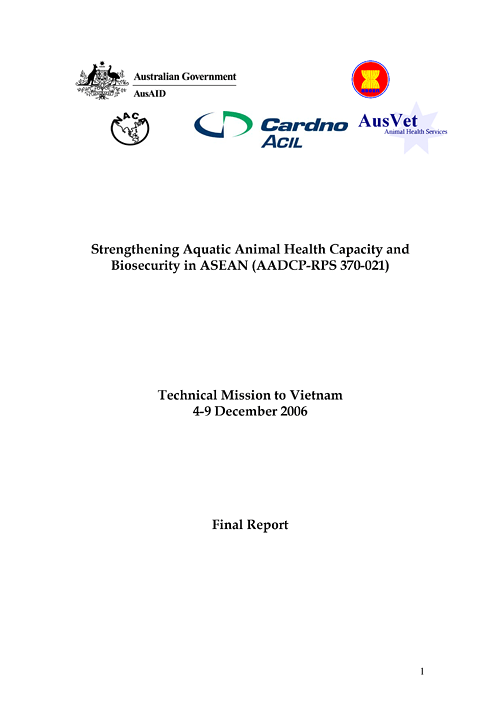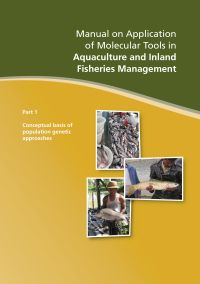Strengthening Aquatic Animal Health Capacity and Biosecurity in ASEAN: Technical mission to Vietnam
30 April 2007 | 1856 Downloads | .pdf | 356.37 KB | Governance and Policy, Health and Biosecurity, Vietnam
This report pertains to the technical mission undertaken to Viet Nam from 3 - 9 December 2006, as a part of the ongoing AADCP-RPS project “Strengthening Aquatic Animal Health Capacity and Biosecurity in ASEAN” to assist national authorities in the development and implementation of simple and practical national aquatic animal health management strategies.
The objective of the Technical mission was to work closely with National Authorities to support development of national strategies on aquatic animal health management and develop short and long term plans. Specifically the TOR of the Technical Mission included:
- Identification of key national issues concerning aquatic animal health.
- Identifying national priorities for aquatic animal health management.
- Developing a framework for national strategies on aquatic animal health.
- Providing recommendations on the work programme of the National aquatic animal health advisory committee.
- Providing recommendations on the National list of diseases.
- Evaluating capacity for national list of diseases.
- Developing a framework for surveillance and reporting.
- Developing a framework for contingency planning.
- Supporting participants of the workshops and training programme to follow up on some of the identified country action plans.
Viet Nam is witnessing a phenomenal growth in aquaculture in recent years. From just over 300,000 tons in 1993, aquaculture production increased to 1,150,000 tons in 2003, and is expected to touch 1.8 million tons in 2006. Catfish (Tra and basa) and shrimp (black tiger) played a major role in this rapid development. Escalating environmental deterioration, increased movement of live aquatic animals for the purpose of aquaculture and the associated aquatic animal health problems, have led to significant economic losses to the sector. Increased use of chemicals, including banned antibiotics, have led importing countries to impose restrictions on Vietnamese aquaculture products. The government of Vietnam has recognized the urgent need to implement comprehensive health management strategies in order to sustain the rapidly developing aquaculture sector.
The technical mission workshop sessions were conducted as per the agenda (Annex 1). In brief, the workshop involved presentations by technical mission team members and national delegates followed by facilitated discussions and development of outputs. Representatives from key national institutions (NAFIQAVED, RIA 1, RIA 3, DAH, Department of Aquaculture, Department of Science and Technology) participated in the discussions. Throughout the sessions, translations were provided. A very informal meeting structure was adopted to encourage active participation of national delegates. Outputs were developed taking into account the existing national frameworks and facilities so that the national aquatic animal health strategies developed are practical and at the same time could be implemented with the existing resources. All the outputs developed during the mission were based on the inputs received from the national delegates.
Creative Commons Attribution.

